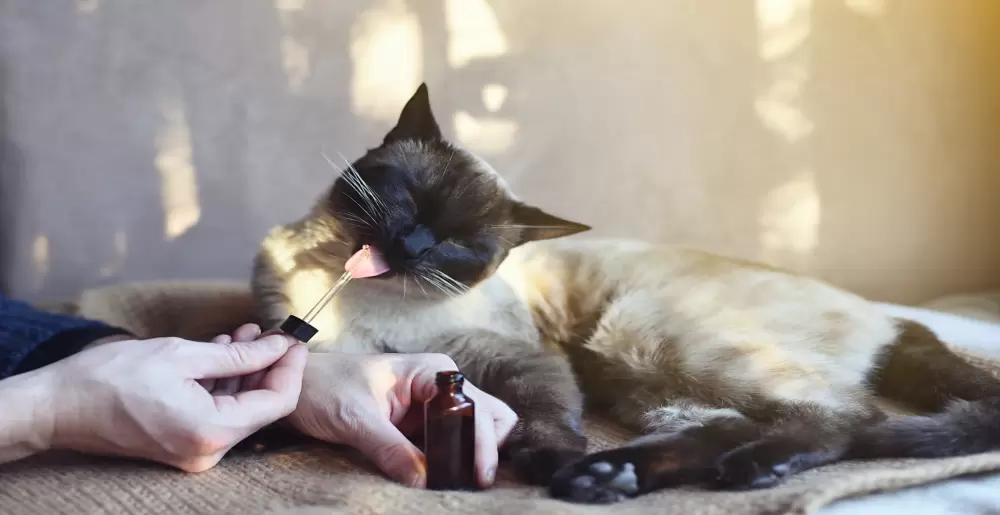CBD OIL FOR PROBLEM BEHAVIOR PET

What's better than the company of a pet? They bring joy to the lives of children, adults and the elderly by providing a source of play, a listening ear, and companionship, especially in moments of loneliness or cold. However, when a pet is not feeling well, this can be challenging. A cat that pees outside the litter box can be a nuisance, while an aggressive dog can even be dangerous. Supporting your pet through difficult times can help them adapt better and improve behavior.
Why does my pet exhibit problem behavior?
Unfortunately, problem behavior is common in pets. The difficult thing is that the cause is often not so easy to discover. For example, pain is often a reason for animals to behave differently. One animal will withdraw (for example crawl into a cupboard or under the bed) while the other animal will behave aggressively. So it is certainly a good idea to first go to the vet if there is a change in behavior to investigate what is wrong!
Problem behavior can manifest itself in aggression (biting, growling, blowing, fighting more often), withdrawing, defecating or urinating next to the litter box or urinating in front of a dog in the house. Social problems can arise, where a dog or cat suddenly no longer wants to play or cuddle. Underlying causes of this type of problem behavior can be:
- Problems with socialization
- Rivalry (other cats or dogs in the neighborhood)
- Instinct to protect home or family members
- Fear
- Abuse
- Pain, inflammation, food hypersensitivity, rash, other medical causes
- Too little distraction (boredom)
- Inconsistent parenting
It may happen that your dog used to enjoy playing with the children, but suddenly stops doing so. Or maybe your cat used to go to the litter box, but no longer does so. Animals usually have a good reason for their behavior and they will never do it to annoy you or other housemates. So it is important to find out what exactly is going on.
The possibilities of CBD for problem behavior in animals
CBD is one of the many cannabinoids in the hemp plant. This substance can work with the body to bring certain processes back into balance. People and animals have an endocannabinoid system. This system is tasked with regulating processes such as digestion, emotions, memory and blood pressure. It responds to both endogenous cannabinoids and phytocannabinoids (from a plant).

CBD oil for anxious animals or joint disorders in dogs
If your dog or cat is afraid, it can be very difficult. Fearful dogs may behave aggressively and attack other dogs or chase cyclists. If you have an anxious cat, there is a chance that it will spend most of the day under the bed. Some cats may also lash out when they are afraid. CBD oil could bring peace to animals that suffer from anxiety. It makes it possible to feel more relaxed physically, but also helps to gain mental peace. But also with joint disorders CBD could possibly help a dog! Some dog studies have found CBD to improve clinical signs associated with osteoarthritis, pruritus, and epilepsy.
Problem behavior due to pain
Many behavioral problems in animals are caused by pain. Your dog, cat or horse can also get bladder infections, inflamed gums or rheumatism. Animals express pain very differently, and many people misinterpret this. Always take your animal to the vet if you notice that it is behaving differently. If research shows that your animal is in pain, treating it with CBD is an option.
Unfortunately, not much research has been done into the effects of CBD in animals. There is a study from 2018, in which dogs with osteoarthritis were administered CBD. Scientists could see that the animals became more active and could move better. CBD was also safe to use. If your animal has a condition that causes pain, you could choose to use CBD.
CBD oil for animals with problem behaviour
Problem behaviour is complex. There can be many different causes for this. Of course, you must first check whether the cause of the problem is not obvious: does your pet receive consistent training, good food and the attention he or she needs? Are there enough toys and does your animal get enough exercise? If that is all in order, you can look further at possible reasons that your furry roommate is behaving in a difficult manner.

















